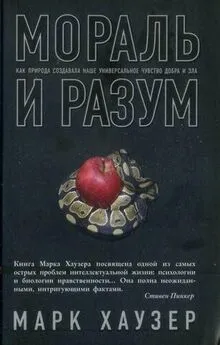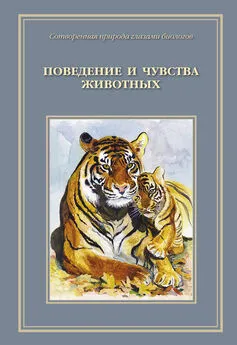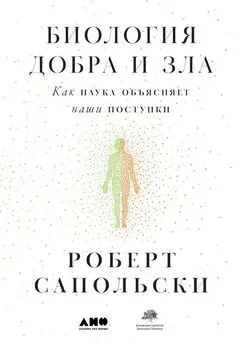Марк Хаузер - Мораль и разум. Как природа создавала наше универсальное чувство добра и зла
- Название:Мораль и разум. Как природа создавала наше универсальное чувство добра и зла
- Автор:
- Жанр:
- Издательство:неизвестно
- Год:неизвестен
- ISBN:нет данных
- Рейтинг:
- Избранное:Добавить в избранное
-
Отзывы:
-
Ваша оценка:
Марк Хаузер - Мораль и разум. Как природа создавала наше универсальное чувство добра и зла краткое содержание
В книге известного американского ученого Марка Хаузера утверждается, что люди обладают врожденным моральным инстинктом, действующим независимо от их пола, образования и вероисповедания. Благодаря этому инстинкту, они могут быстро и неосознанно выносить суждения о добре и зле. Доказывая эту мысль, автор привлекает многочисленные материалы философии, лингвистики, психологии, экономики, социальной антропологии и приматологии, дает подробное объяснение природы человеческой морали, ее единства и источников вариативности, прослеживает пути ее развития и возможной эволюции. Книга имела большой научный и общественный резонанс в США и других странах. Перевод с английского Т. М. Марютиной Научный редактор перевода Ю. И. Александров
Мораль и разум. Как природа создавала наше универсальное чувство добра и зла - читать онлайн бесплатно полную версию (весь текст целиком)
Интервал:
Закладка:
Cosmides L. & Tooby J. (2000). The cognitive neuroscience of social reasoning // M. Gazzaniga (Ed.), The New Cognitive Neurosciences (p. 1259—1270). Cambridge, MA: MIT Press.
Csibra G. & Gergely G. (1998). The teleological origins of mentalistic action explanation: A developmental hypothesis // Developmental Science, 1 , 255—259.
Csibra G., Gergely G., Biro S., Koos D. & Brockbank M. (1999). Goal attribution without agency cues: The perception of “pure reason” in infancy // Cognition, 72, 237—267.
Cummins D. (1996a). Evidence for the innateness of deontic reasoning // Mind and Language, 11, 160—190.
Cummins D. (1996b). Evidence of deontic reasoning in 3-and 4-year-old children // Memory and Cognition, 24, 823—829.
Cunningham W. A., Nezlek J. B. & Banaji M. R. (2005). Implicit and explicit ethnocentrism: revisiting the ideologies of prejudice // Personality and Social Psychology Bulletin, 31, 105—132.
Daalder I. H. & Lindsay J. M. (2004). America Unbound: The Bush Revolution in Foreign Policy. Washington: Brookings Institution Press.
Daly M. & Wilson M. (1988). Homicide. Hawthorn, NY: Aldine de Gruyter.
Daly M. & Wilson M. (1998). The Truth About Cinderella. New Haven, CT: Yale University Press.
Damasio A. (1994). Descartes’ Error. Boston: Norton.
Damasio A. (2000). The Feeling of What Happens. New York: Basic Books.
Darwall S. (1998). Philosophical Ethics. Boulder: Westview Press.
Darwin C. (1871). The Descent of Man and Selection in Relation to Sex. Princeton, NJ: Princeton University Press.
Darwin C. (1872). The Expression of the Emotions in Man and Animals. London: John Murray.
Darwin C. (1958). The morality of evolution. Autobiography. London: Norton.
Davidson R. J., Scherer K. R. & Goldsmith H. H. (2003). Handbook of Affective Sciences. New York: Oxford University Press.
Dawkins M. S. (1983). Battery hens name their price: consumer demand theory and the measurement of ethological ‘needs’ // Animal Behaviour, 31, 1195—1205.
Dawkins M. S. (1990). From an animal’s point of view: motivation, fitness and animal welfare // Behavioral and Brain Sciences, 13, 1—61.
Dawkins R. & Krebs J. R. (1978). Animal signals: information or manipulation // J. R. Krebs & N. B. Davies (Eds.), Behavioural Ecology (p. 282—309). Oxford: Black-well Scientific Publications.
de Quervain D. J.-F., Fischbacher U., Treyer V, Schellharmmer M., Schnyder U., Buck A. & Fehr E. (2004). The neural basis of altruistic punishment // Science, 305, 1254—1258.
de Waal F. В. M. (1982). Chimpanzee Politics. Baltimore: Johns Hopkins University Press.
de Waal F. В. M. (1989а). Food sharing and reciprocal obligations among chimpanzees //Journal of Human Evolution, 18, 433—459.
de Waal F. В. M. (1989b). Peacemaking among primates. Cambridge: Cambridge University Press.
de Waal F. В. M. (1996). Good Natured. Cambridge, MA: Harvard University Press.
de Waal F. В. M. (2000a). Attitudinal reciprocity in food sharing among brown capuchin monkeys // Animal Behaviour, 60, 253—261.
de Waal F. В. M. (2000b). Primates: a natural heritage of conflict resolution // Science, 289 , 586—590.
de Waal F. В. M. & Berger M. L. (2000). Payment for labour in monkeys // Nature, 404 , 563.
Deary /. /. (2001). Intelligence: A Very Short Introduction. Oxford: Oxford University Press.
DeBruine L. M. (2002). Facial resemblance enhances trust // Proceedings of the Royal Society, London, B, 269 , 1307—1312.
Dehaene S. (1997). The Number Sense. Oxford: Oxford University Press.
Dennett D. C. (2003). Freedom Evolves. New York: Viking.
DePaulo В. M., Jordan A., Irvine A. & Laser P. S. (1982). Age changes in the detection of deception // Child Development, 53, 701—709.
Dewey J. (1922/1988). Human nature and conduct // J. Dewey (Ed.), Collected Works: The Middle Works, Volume 14. Carbondale, IL: Southern Illinois University Press.
Dienes 2. & Pemer J. (1999). A theory of implicit and explicit knowledge // Behavioral and Brain Research, 22, 735—755.
Dolinko D. (1992). Three mistakes of retributivism // UCLA Law Review, 39, 1623—1657.
Dovidio /. F., Glick P & Rudman L. (2005). On the Nature of Prejudice: 50 Years after Allport. New York: Blackwell Publishing.
Downey G. & Feldman S. (1996). Implications of rejection sensitivity for intimate relationships // Journal of Personality and Social Psychology, 70, 1327—1343.
Downey G., Feldman S. biAyduk O. (2000). Rejection sensitivity and male violence in romantic relationships // Personal Relationships, 7, 45—61.
Driscoll D. M., Anderson S. W. & Damasion H. (2004). Executive function test performances following prefrontal cortex damage in childhood. San Diego: Society for Neurosciences Abstract.
Ducoing A. M. & Thierry B. (2003). Withholding information in semifree-ranging tonkean macaques //Journal of Comparative Psychology, 117, 67—75.
Dugatkin L. A. (1997). Cooperation Among Animals: An Evolutionary Perspective. New York: Oxford University Press.
Duncan D. (1993). Miles from Nowhere: Tales from America’s Contemporary Frontier. New York: Viking/Penguin Press.
Durkin D. (1961). The specificity of children’s moral judgments // Journal of Genetic Psychology, 98, 3—13.
Dworkin R. (1993). Life’s Dominion: An argument about abortion, euthanasia, and individual freedom. New York: Alfred A. Knopf.
Ebbesen M. (2002). The Golden Rule and Bioethics. Unpublished Master’s, University of Aarhus, Aarhus, The Netherlands.
Eisenberg N., Losoya S. & Spinrad T (2003). Affect and prosocial responding // R. J. Davidson & K. R. Scherer & H. H. Goldsmith (Eds.), Handbook of Affective Sciences (p. 787—803). New York: Oxford University Press.
Ekman P. (1985). Telling lies: Clues to deceit in the marketplace, marriage, and politics. New York: WW Norton.
Ekman P. (1992). An argument for basic emotions // Cognition and Emotion, 6, 169—200.
Ekman P., Friesen W. V & O'Sullivan M. (1988). Smiles while lying //Journal of Personality and Social Psychology, 54, 414—420.
Ekman R & O'Sullivan M. (1991). Who can catch a liar? // American Psychologist, 46, 913—920.
Ekman R, O'Sullivan M., Friesen W. V & Scherer K. R. (1991). Face, voice, and body in deceit //Journal of Nonverbal Behavior, 15, 125—135.
Ellis H. D. & Lewis M. B. (2001). Capgras delusion: a window on face recognition // Trends in Cognitive Science, 5, 149—156.
Elster J. (1979). Ulysses and the Sirens. Cambridge: Cambridge University Press.
Elster J. (2000). Ulysses Unbound. New York: Cambridge University Press.
Emery J. (2003). Reputation is everything. Available: http://www.worldandi.com/newho m e/public/2003/may/clpub.asp.
Emery N. J. & Clayton N. S. (2001). Effects of experience and social context on prospective caching strategies by scrub jays // Nature, 414, 443—446.
Engel H. (2002). Crimes of Passion: An Unblinking Look at Murderous Love. Westport, CT: Firefly Books.
Epstein J. (2003). Envy. Oxford: Oxford University Press.
Fairbanks L. A. (1996). Individual differences in maternal style of Old World monkeys // Advances in the Study of Behaviour, 25, 579—611.
Fairbanks L. A., Melega W. R, Jorgensen M. J., Kaplan J. R. & McGuire M. T. (2001). Social impulsivity inversely associated with CSF 5-HIAA and Fluoxetine exposure in vervet monkeys // Neuropsychopharmacology, 24, 370—378.
Fehr E. (2002). The economics of impatience // Nature, 415, 269—272.
Fehr E. & Fischbacher U. (2003). The nature of human altruism—Proximate and evolutionary origins // Nature, 425, 785—791.
Fehr E. & Gachter S. (2002). Altruistic punishment in humans // Nature, 415, 137— 140.
Fehr E. & H enrich J. (2003). Is strong reciprocity a maladaptation? On the evolutionary foundations of human altruism // P. Hammerstein (Ed.), The Genetic and Cultural Evolution of Cooperation (p. 55—82). Cambridge, MA: MIT Press.
Ferguson M. J. & Bargh J. A. (2004). How social perception can automatically influence behavior // Trends in Cognitive Science, 8, 33—38.
Fessler D. M. T. (1999). Toward an understanding of the universality of second order emotions // A. Hinton (Ed.), Beyond Nature or Nurture: Biocultural approaches to the emotions (p. 75—116). New York: Cambridge University Press.
Fessler D. M. T, Arguello A. P., Mekdara J. M & Macias R. Disgust sensitivity and meat consumption: A test of an emotivist account of moral vegetarianism // Appetite, 4/(1), 31—41.
Fessler D. M. T & Haley K. J. (2003). The strategy of affect: emotions in human cooperation // P Hammerstein (Ed.), Genetic and Cultural Evolution of Cooperation (p. 7—36). Cambridge, MA: MIT Press.
Fiddick L. (2004). Domains of deontic reasoning: resolving the discrepancy between the cognitive and moral reasoning literatures // The Quarterly Journal of Experimental Psychology, 57A, 447—474.
Fiddick L., Cosmides L. & Tooby J. (2000). No interpretation without representation: the role of domain-specific representations in the Wason selection task // Cognition, 77, 1—79.
Fischer J. M. & Ravizza M. (1992). Ethics: Problems and Principles. New York: Holt, Rinehart & Winston.
Fiser J. biAslin R. N. (2001). Unsupervised statistical learning of higher-order spatial structures from visual scenes // Psychological Science, 12, 499—504.
Fiske A. R (2002). Socio-moral emotions motivate action to sustain relationships // Self and Identity, 7, 169—175.
Fiske A. P. (2004). Four modes of constituting relationships // N. Haslam (Ed.), Relational Models Theory: A contemporary overview. Mahwah, NJ: Lawrence Erlbaum.
Fiske A. P. & Tetlock P. E. (2000). Taboo trade-offs: constitutive prerequisites for political and social life // S. A. Renshon & J. Duckitt (Eds.), Political Psychology: Cultural and Crosscultural Foundations (p. 47—65). London: Macmillan Press.
Fiske S. T (1998). Stereotyping, prejudice, and discrimination // D. T. Gilbert & S. T. Fiske & G. Lindzey (Eds.), The Handbook of Social Psychology (p. 357— 411). New York: McGraw Hill.
Fitch W. T, Hauser M. D. & Chomsky N. (2005). The evolution of the language faculty: clarifications and implications // Cognition, 97, 179—210.
Flanagan O. (1996). Self Expressions. Mind, morals and the meaning of life. New York: Oxford University Press.
Flombaum J. & Santos L. (2005). Rhesus monkeys attribute perceptions to others // Current Biology, 75, 1—20.
Читать дальшеИнтервал:
Закладка:






